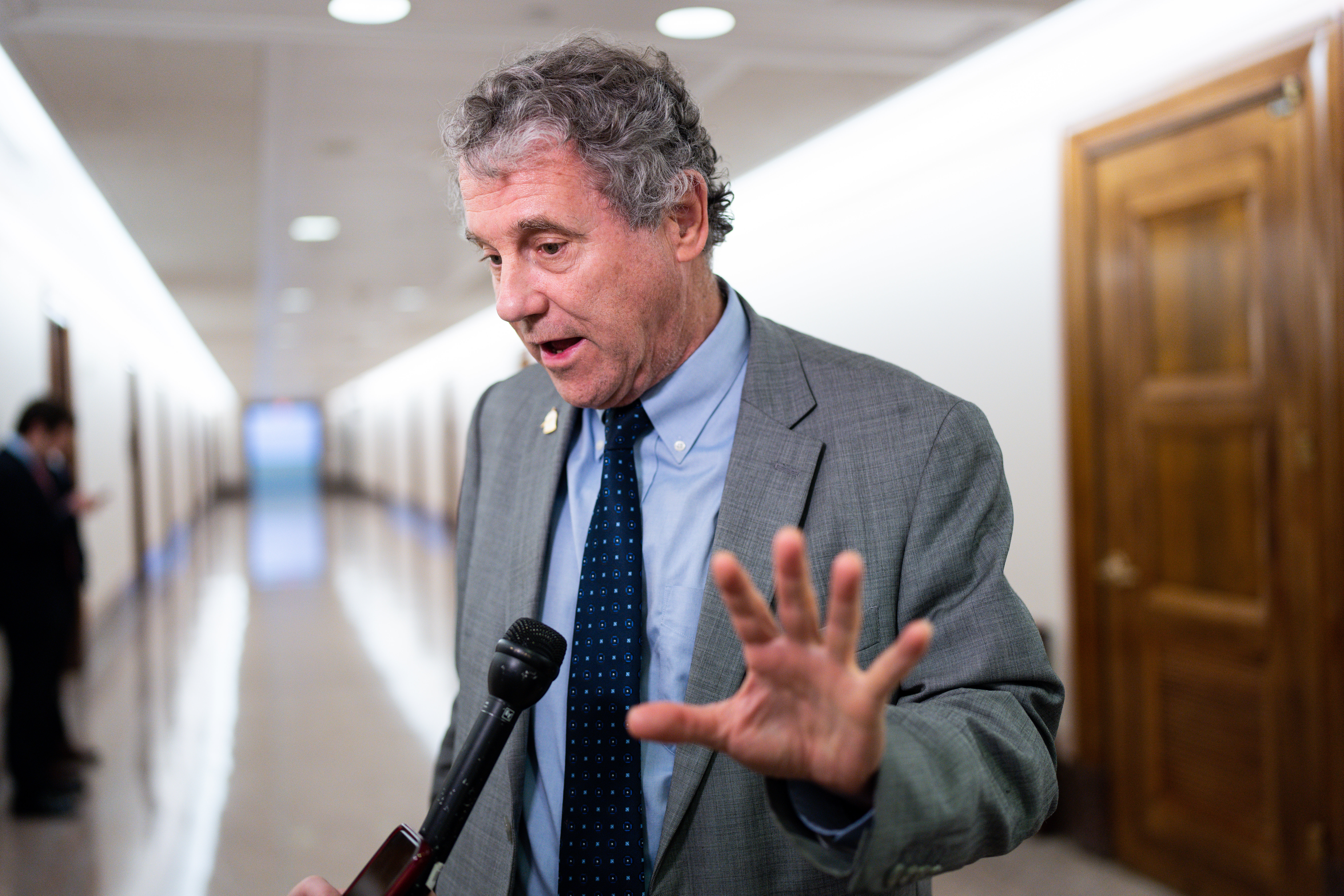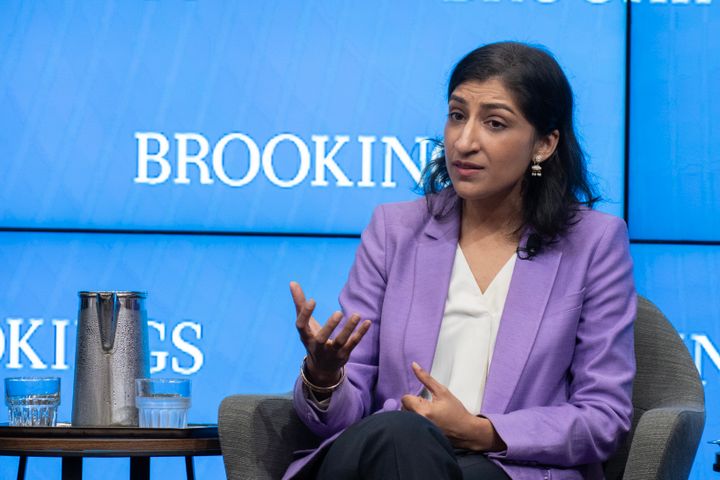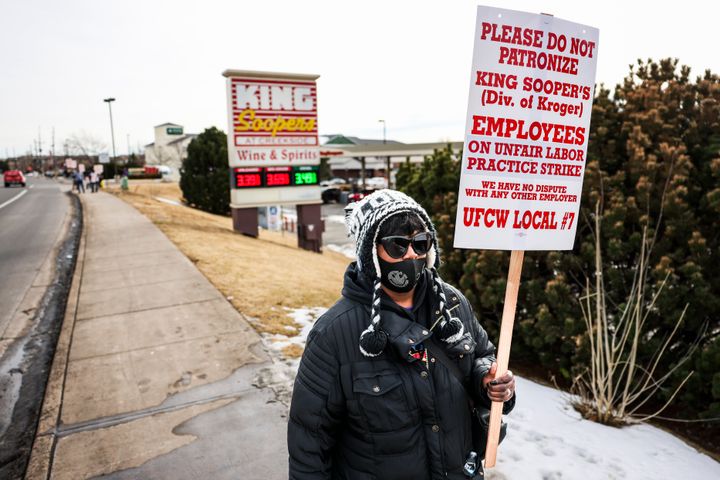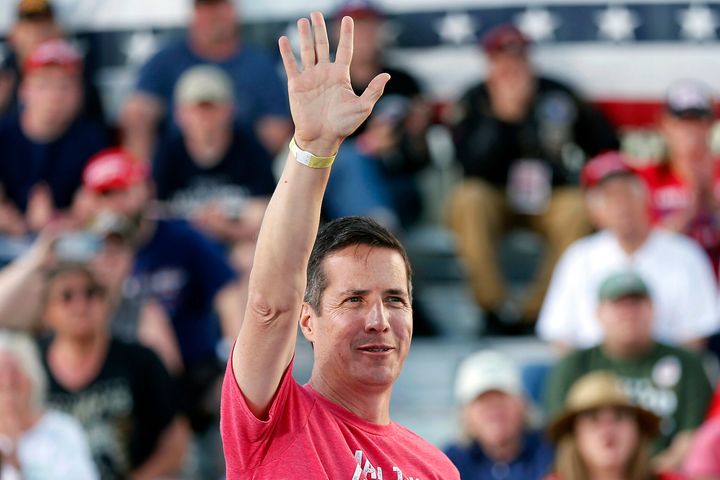
Sen. Sherrod Brown has a well-deserved reputation as an economic progressive and staunch union ally, whose focus on the “dignity of work” has helped him hold his seat for three terms in the increasingly Republican state of Ohio.
But Brown, who is up for reelection in a race that will be critical to Democrats retaining control of the Senate, broke from that reputation when he endorsed Cincinnati-based Kroger’s acquisition of Albertsons — a merger that progressive groups have lined up against and the Federal Trade Commission is challenging. Albertsons and Kroger are already the two largest grocery store chains in the country, and if successful, the $24.6 billion purchase would be the biggest supermarket merger in U.S. history.
Brown’s support for the merger also puts him at odds with the influential labor unions involved, who oppose the deal because of expected layoffs. Antitrust experts also insist that by reducing options in key markets, the merger would hammer consumers.
“We’ve seen over and over that mergers of this size and scale are bad for consumers and bad for workers.”
- Lee Hepner, American Economic Liberties Project
“We’ve seen over and over that mergers of this size and scale are bad for consumers and bad for workers,” said Lee Hepner, legal counsel at the American Economic Liberties Project, an anti-monopoly think tank, which produced a paper analyzing the merger’s potential effects.
“This merger in particular will create additional harms to independent grocers and food producers who either compete against Kroger and Albertsons, or negotiate with them for fair compensation.”
Brown has insisted the merger is necessary to help the two unionized chains compete with non-union big-box stores, and sees removing Albertsons from the control of private equity — which has a long history of disassembling companies and displacing their workers — as a positive.
“Senator Brown knows that a union card means higher wages, better benefits and working conditions, and more control over your schedule,” Brown spokesperson Kevin Donohoe told HuffPost. “He’s focused on fighting for workers and ensuring that food is affordable for Ohioans.
“The Senator believes that if this merger is done correctly, and Kroger ensures that workers have a seat at the table, the company has the potential to become one of the largest union companies in an industry that is increasingly dominated by nonunion corporate giants,” Donohoe added. “It’s in the interest of both grocery shoppers and workers for unionized grocery chains to stay out of the hands of private equity and be able to compete with megastores like Walmart, Amazon and Target.”

How Brown sells his support for the deal could help make or break his run for reelection at a time when high grocery prices drive voter discontent with the economy, even as inflation has cooled significantly. Brown’s union ties are also one of his biggest selling points to the white working-class voters who dominate Ohio politics.
The FTC, now under the leadership of aggressive antitrust crusader Lina Khan, announced in late February it was suing to block Kroger’s acquisition of Albertsons on the grounds that it would “lead to additional grocery price hikes for everyday goods, further exacerbating the financial strain consumers across the country face today.”
The FTC complaint notes that Kroger and Albertsons are themselves the products of decades of mergers, responsible for making them the largest and second-largest supermarket chains in the country, respectively. Kroger (or Kroger-owned brands like Ralphs, Fred Meyer, King Soopers and Harris Teeter) compete against Albertsons (or Albertsons-owned brands like Safeway, Jewel-Osco, Vons and Acme) in more than 100 metropolitan areas across 18 states and the District of Columbia. In those areas, a merger would reduce competition enough to meaningfully increase prices for consumers, and thus violates antitrust law, Khan wrote in the complaint, which was backed by fellow FTC Commissioners Rebecca Kelly Slaughter and Alvaro Bedoya.
“This merger has the potential to be great for the region and great for workers.”
- Sen. Sherrod Brown (D-Ohio), June 2023
Antimonopoly advocates are especially mistrustful of the two supermarket giants because both Kroger CEO W. Rodney McMullen and Albertsons CEO Vivek Sankaran have reportedly spoken positively to investors about the effect of 3-4% inflation on their companies’ fortunes, since they can pass price hikes along to consumers. “A little bit of inflation is always good in our business,” McMullen said in June 2021, according to a CNN report on his and Sankaran’s remarks on earnings calls.
The prospect of fewer choices and higher prices in a number of states has prompted opposition to the merger from unexpected corners. For instance, Republican Sens. Lisa Murkowski and Dan Sullivan of Alaska — a state where Kroger and Albertsons compete — both called for the FTC to block the merger in September.
When Brown announced his qualified support for the merger in remarks to the Cincinnati Chamber of Commerce in June, he pointed to the two companies’ unionized workforces, saying the deal is an opportunity to improve the fortunes of organized labor in the supermarket sector.
“This merger has the potential to be great for the region and great for workers,” Brown said. “I’ve been in touch with Kroger CEO Rodney McMullen. He knows that companies like Kroger need to work collaboratively with their unions if they want to succeed in the future. This would make them one of the largest union employers in the country, if they do this right.”
Kroger features Brown’s comments on a webpage promoting the merger that also includes endorsements from Rep. Greg Landsman, a first-term moderate Democrat representing Cincinnati; former Sen. Cory Gardner (R-Colo.), who is now a board member at a Washington lobbying firm; and the Competitive Enterprise Institute, a libertarian think tank.

Federal lawmakers do not have a direct say in whether the FTC decides to sue to stop a corporate merger. But companies nonetheless seek out congressional support for mergers and other actions subject to regulatory scrutiny, so as to raise the political price of action for the FTC or other federal agencies with oversight power.
Following Brown’s comments, he got a surge in donations from top Kroger executives totaling $31,782 — almost all in August — after receiving just $6,000 from executives earlier in his term over the course of four years. Donors who contributed $3,300 — the maximum individual amount per primary or general election cycle — included Kroger Vice President of Operations Mary Adcock, Chief Financial Officer Gary Millerchip, Chief Merchant and Marketing Officer Stuart Aitken, Chief Information Officer Yael Cosset and Chief People Officer Tim Massa.
McMullen, the Kroger CEO, and Corporate Affairs Vice President Keith Dailey also maxed out to Brown in August, but got partial refunds, since their contributions in 2022 meant they had exceeded their limits for that cycle.
Kroger employees and executives, including McMullen, have given to Brown over the course of his career as a senator or Senate candidate. But company employees’ total contributions to Brown during his three previous Senate runs, including from low-level workers like deli clerks, totaled $24,377 over 18 years.
Brown also received $6,600 — the maximum allowable contribution for both the primary and general election cycles — from Albertsons’ Sankaran in August. Those donations were the first that Brown received from anyone employed by Albertsons during his career in the Senate.
In addition to the donations from Kroger and Albertsons executives following Brown’s remarks, the two companies’ corporate PACs are major contributors this cycle. Kroger’s PAC gave Brown $7,500 this cycle — $2,500 in April 2022, and $5,000 in March 2023, shortly after the company hired Squire Patton Boggs to lobby on behalf of the merger in Congress. The Albertsons PAC, which had not previously given to Brown’s campaigns, contributed $5,000 toward Brown’s reelection in August.
During Brown’s three previous Senate runs, Kroger’s PAC had given him $13,500, and a PAC for Safeway, which is now owned by Albertsons, had given Brown $3,500.
The more recent donations from the Kroger and Albertsons executives and PACs are still a microscopic part of Brown’s fundraising. He’s raised $22 million since 2023, including $7.3 million from donors giving less than $200. Donohoe declined to comment on the donations from Kroger and Albertsons executives and the companies’ PACs.
Craig Holman, an ethics expert and Capitol Hill lobbyist for the liberal group Public Citizen, takes Brown’s stance at face value, but sees the contributions from Kroger and Albertsons as symptoms of a bigger problem.
“I have no doubt that Brown is sincere in his advocacy for labor interests in this merger. But the current system of campaign financing allows for many to question that sincerity.”
- Craig Holman, Public Citizen
“I have no doubt that Brown is sincere in his advocacy for labor interests in this merger,” he said. “But the current system of campaign financing allows for many to question that sincerity.”
Like many companies trying to avoid falling afoul of antitrust laws, Kroger and Albertsons agreed in September to “spin off” — or sell — 413 of its thousands of stores to C&S Wholesale Grocers.
But Khan and her fellow FTC complainants noted that it is not clear how well-equipped C&S is to scale up its retail business. The New Hampshire-based company was originally a wholesaler and currently only operates 23 supermarkets and one retail pharmacy, raising questions about the durability of the sale, the FTC commissioners charge.
“C&S will face multiple significant obstacles stitching together a viable business—let alone a successful competitor—from the assortment of divested stores, and any operational shortcoming would imperil competition in many local markets,” Khan, Slaughter, and Bedoya write.
What’s more, sometimes a divestiture aimed at helping big mergers comply with antitrust law fails in such a way that the big company spinning them off ultimately recoups some of them later on, as the American Economic Liberties Project points out in the paper on the merger it released in November.
For example, the small supermarket chain Haggen struggled to absorb the 146 Albertsons stores it purchased in a spinoff when Albertsons acquired Safeway in 2014. After Haggen filed for bankruptcy in 2015, Albertsons ended up buying back at a discount 33 former Albertsons stores that it had sold to Haggen.
The Kroger-Albertsons merger’s negative impact on workers is likewise poised to be substantial, since it would reduce the number of employers separately competing for workers. And while Brown celebrates the prospect of a massive, 700,000-employee company with a strong union presence, the FTC commissioners wrote that they foresee a situation in which the company would have greater power over the union by eliminating the unions’ ability to exploit the two supermarket chains’ competition with one another.
“The proposed acquisition would eliminate that competition, likely leading to lower wages and reduced benefits, opportunities, and quality of workplace conditions and protections for thousands of Respondents’ employees,” Khan, Slaughter, and Bedoya write in the complaint.
That’s on top of the near-term impact of store closures and layoffs likely to result from the Kroger-Albertsons merger. As when any big company acquires a competitor, Kroger is expected to wring profit from its purchase by shuttering stores in markets where an Albertsons location exists and laying off at least some of the unionized grocery clerks, warehouse workers and truck drivers employed at those locations.

Concerns about layoffs prompted both the United Food and Commercial Workers, which represents store clerks, and the International Brotherhood of Teamsters, which represents truck drivers and warehouse workers, to come out against the merger.
In their statements of opposition, the unions cited the companies’ failure to communicate about the potential impact on workers, with UFCW lamenting the “lack of transparency” and Teamsters panning the companies’ “vague promises about [their workers’] future.” Those comments stand in stark contrast with the good-faith negotiations that Brown hoped Kroger and Albertsons would conduct with the unions.
The mega-merger is not entirely bereft of labor support though. UFCW Local 555 in the Pacific Northwest region broke with the international UFCW to endorse the deal in late February, after the Local’s president had an encouraging meeting with an official from C&S.
Brown faces what is likely to be his toughest reelection battle yet. He is set to square off against the winner of the state’s March 19 Republican primary, where self-funded businessman Bernie Moreno is leading thanks to the backing of former President Donald Trump.
The sting of the inflation spike in 2021 and 2022 could still be a key issue in battleground races like Brown’s. And his support for the merger might make that more of a liability for him specifically.
None of the three leading Republican contenders ― Moreno, state Sen. Matt Dolan and Secretary of State Frank LaRose ― have weighed in on the merger, however. HuffPost reached out to spokespeople for all three candidates and did not receive responses.
Other Democrats have come out swinging against the deal. In Nevada, a state the FTC says would be affected by the merger, Sen. Jacky Rosen, a Democrat up for reelection, is effectively campaigning on her opposition to it.
Her office promoted a number of local news segments covering the FTC lawsuit and Rosen’s approving reaction to it. Rosen had written a letter pushing the agency to stop the deal in December.
“Am I gonna take big corporations at their word when they say they want to merge and they’re gonna make it better for the consumer, when they’re gonna give you less choice and less competition?” Rosen said in a KTVN Reno interview on Feb. 28. “I say it doesn’t take an expert to think maybe we shouldn’t take them at their word. That’s why the FTC is suing to block this merger.”
Disclaimer: The copyright of this article belongs to the original author. Reposting this article is solely for the purpose of information dissemination and does not constitute any investment advice. If there is any infringement, please contact us immediately. We will make corrections or deletions as necessary. Thank you.
